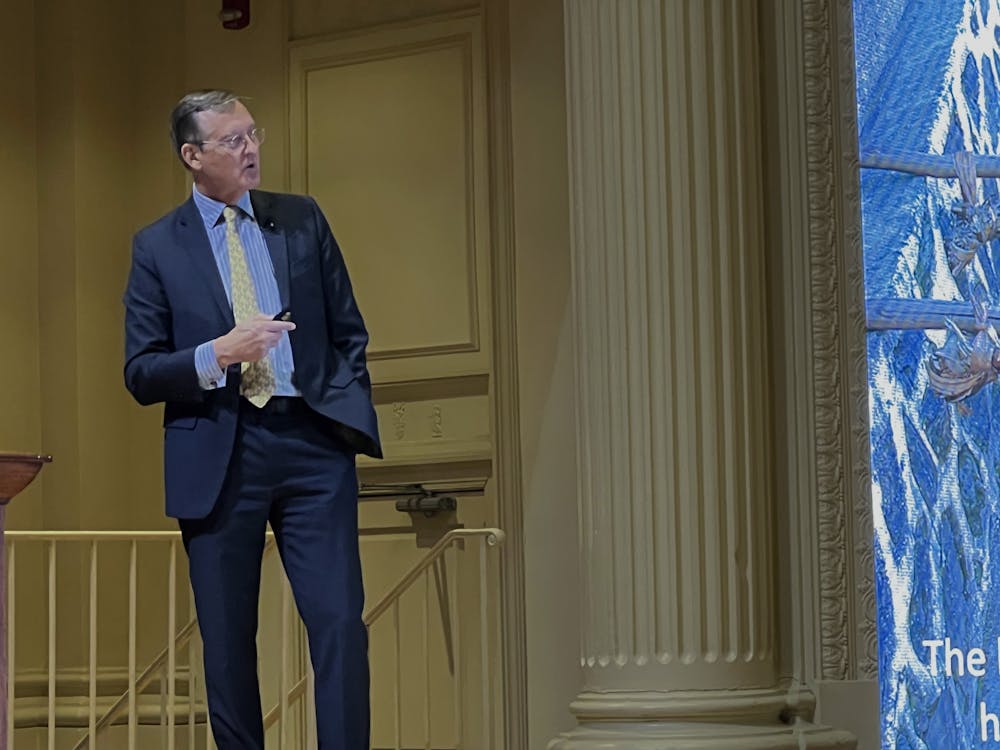Dr. Caleb King gave Elon University a look into his 16 years in Rwanda as he delivered the 2023 James P. Elder Lecture on Thursday.
In 2003, King and his wife Louise King brought their family to Rwanda after being invited to work in the community. In his 16 years away from the States, he had helped build hospitals, churches and bring electricity to the community.
King reflected on his time first visiting Rwanda before he started improving the hospital.
“I was struck on my arrival to Rwanda, that I can not deny. Their problems are so hard and so vastly different on one scale, but they were so similar,” King said. “People had the same worries and concerns, a yearn for survival and safety.”
King had begun gathering people and utilizing connections he had around the world to improve the hospital. His team and he repainted the hospital, including a maternity ward the community helped prioritize. Prior to the rebuild, King said the hospitals had limited supplies and space.
“The patients were lying on the floor because there were no beds, no mattresses, and there was still broken glass in places that had to be swept up,” King said.
Throughout his time in Rwanda, King also assisted with improving medical education throughout his town. One program King helped begin related to educating and treating people about HIV, a pressing issue in the town.
“The HIV programs really transformed people's thinking, because until we had treated HIV people thought, ‘Well it's not a disease because, with diseases, you get medicine and get better,’” King said.
In another instance, King worked with a young Rwanda native to help educate deaf individuals. The boy that King had worked with went on to begin his own charity, got into the U.S. and is soon beginning his Ph.D. at Stanford. King, however, does not credit himself for the boy's accomplishments.
“All I had to do was love one boy. That made a difference,” King said.
King had made many connections during his time in Rwanda, something he takes pride in and hopes to continue. When bringing electricity into the town, King used his many connections to implement hydropower for sustainable electricity.
“It was a great thing to be able to work on together. I simply couldn't have done it if there wasn't anyone around who could say, ‘Yes I know what to do,’” King said.
For junior Bruce Vagt the idea of working with different specialties resonated with him as he prepares for a future in environmental engineering.
“The main idea from King that I got was that diversity without unity lacks cohesion,” Vagt said. “We need to become part of that diversity through scientific specification.”
King currently works at North Carolina at Chapel Hill as the executive director of the Institute for Convergent Science. He stressed the importance of diversity and collaboration on college campuses.
“Without convergence, without unity, the very strength of our universities' qualities would drift apart in every direction,” King said.
King's words had Rachel Mills, a visiting family friend of King’s, thinking about her own community with the goal of increasing her connections.
“Connections are everything from some class you took you did not think you would do anything with, to some people you met at an airport one time,” Mills said.
Now having returned from Rwanda, King had many stories to tell and many more connections to make.He encourages students to help where they can and not overwhelm themselves.
“You alone are one small part of what is happening, you don't have to carry the world on your shoulders,” King said. “We must believe that there is hope.”


